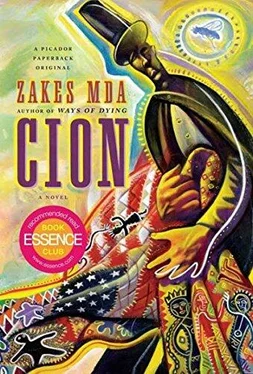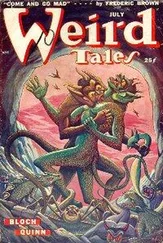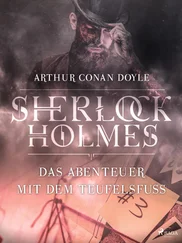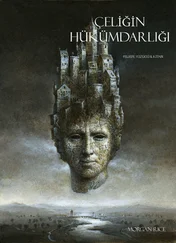“Tending to it? All day long? How do you tend to something like that all day long?” I ask.
“He sits on the porch and looks at it. That’s how he tends to it. Sometimes he rearranges two or three of the figures. Or he straightens a flag that’s been disturbed by the wind.”
I am beginning to hold Mr. Quigley in great awe though no word has passed between us.
Obed says that on some days his father visits the Kilvert Community Center and sits with other brooding elders on the porch or watches the women quilt inside. Among donated items he may pick up a figure to add to his garden collection. A plastic dog or a porcelain pink flamingo. Ruth, on the other hand, spends her time tending to her vegetable garden or quilting in her own living room, not at the Kilvert Community Center, since her falling-out with the women there.
In the house dinner is served and Mr. Quigley is already seated at the table. After giving Ruth the Swiss chard we take our places and she mumbles a few words of grace. Obed says to his father: “Mr. Quigley, this is my friend from Africa.”
Mr. Quigley stretches his arm across the table and gives me a firm handshake.
“My name is Toloki, sir,” I tell him.
“Mahlon Quigley at your service,” he says. And that’s the last I hear his voice for the evening. Throughout dinner he ignores me as he does the rest of the table, as if I have always been part of his family.
The home-cooked food is good, after living on fast foods for the past few days. The corn bread that Ruth breaks with her hands and places on the bare table in front of everyone is particularly tasty. And so is the cannellini bean soup in which lie chunks of meat. I do not want to waste time with the Swiss chard and tomato salad even though Ruth praises the dressing which she made herself.
The meat is pork, Ruth says, expressing her hope that I do eat pork. Mr. Quigley slaughtered the pig a few days earlier. This, she warns me in her conspiratorial tone once more, is illegal because it is against health regulations to kill animals in your own backyard. It is a sore point because it has changed the people’s way of life.
“We used to slaughter lotsa hogs,” Ruth says. “I used to pickle them legs. I still do though we don’t slaughter that much no more because we don’t wanna end up in the pokey. Mr. Quigley likes the liver…the way I do it.”
“It’s against the law, Ma,” Obed cuts in. “You can always buy liver from Wal-Mart. We gotta stop this slaughtering of hogs.”
“Todoloo!” says Ruth, turning her forefinger on her forehead as if to say her son has lost it. “We ain’t doing no harm to nobody. Our people have always grown their own food. We ain’t gonna stop now.”
I have been hearing this refrain about “our people” since last night and I wonder aloud who these people are. But all Ruth can say is: “We don’t belong to nobody. Our race of people is different from any race of people that ever lived on earth.”
Obed adds helpfully: “Yeah, we don’t belong nowhere. White people hate us because we ain’t white enough. Black people hate us too. They call us high-yella-niggers. They are jealous of our complexion.”
This does not help me at all. But I let it go. We eat quietly for some time. Obed wolfs his food while Mr. Quigley chews with a slow deliberate unchanging rhythm, his smiling face savoring every morsel. Ruth looks very pleased with herself that her menfolk are enjoying her cooking. Obed breaks the silence by telling them about my job: I mourn for the dead. Neither parent shows any astonishment at all. Instead Ruth wants to know how I do it. My respect for this family is further enhanced: most people, when told I am a professional mourner, want to know why I do it…not how.
“I came in search of mourning,” I tell Ruth when she inquires what my mission is in these parts. I do not think they will understand if I tell them about the sciolist and Sam Crowl’s challenge. So I leave that bit out.
“Have you found any yet in our good ol’ U.S. of A.?” Ruth wants to know.
“I was at The Ridges last night…at the cemetery there…just before I went to join the Court Street parades. I was disappointed.”
Ruth says the family is disappointed about that cemetery too. Mahlon Quigley’s mother lies buried there and the family has been struggling to locate her grave. They need to lay a memorial stone, which will make him a very happy man and will change his fortunes. He will never really know peace until a proper stone is laid there with her name and her dates of birth and death and words to the effect that she is remembered with love. But no one knows how to go about finding her grave since the graves have no names.
Obed’s face shows that this is not his favorite topic. He suddenly remembers that Orpah also needs to eat. There is silence while he goes to call her from her room. The music of the sitar stops. Obed comes back and announces: “She says she ain’t hungry. Maybe she wanna lose some weight.”
“If that girl loses any more weight she’ll blow away!” shouts Ruth, clearly for Orpah’s benefit in her bedroom.
The sitar resumes with a vengeance.

It is still dark outside. I had a restful night in Obed’s bed while he took refuge on a sponge mattress in the attic. But I must wake up. Force of habit. I find it difficult to sleep beyond 5 A.M. Perhaps I will take a walk in the garden, as long as I make sure that I don’t step on Mahlon Quigley’s crops. I may even venture further into the village; maybe walk to the cemetery while the village is still asleep. Why, I may even mourn a bit. Just for a few minutes. Surely there’ll be names on all the headstones and even epitaphs on some of them. I may be able to engage in my old pastime of re-creating the lives and the deaths of the dead for the pleasure of mourning them. My body cries for mourning. It has been quite some time.
In the living room Ruth is already sitting at the metal table sewing a quilt. She is in a bathrobe and I am wondering if she slept at all. She looks at me tiredly and smiles.
“No rest for the wicked,” she says.
“It’s just that my body is used to waking up early.”
“I’m talking about me,” she says, and offers me coffee.
“I am fine, ma’am; I am not really one for coffee.”
“You know something about quilts?” she asks.
I confess my ignorance. Her eyes brighten as she tells me how her people are a quilting people. For generations and generations before her. Old quilts embody the life of the family. Not only was the batting of some of them made from the clothes that people had worn; but people were made on them—“If you know what I mean,” she adds in that conspiratorial tone — people were born on them, people got sick on them, people died on them. Cycles of loves and losses were enacted on the quilts. The souls of those who are gone rest in the very threads of the quilts.
Then she walks with the aid of a cane to her bedroom and returns with two very old and dirty-looking quilts.
“Smell these,” she says.
It is a peculiar smell. Musty, yes, but also aromatic.
The two quilts, she says, were made by her great-great-grandmother before the Civil War. One is an Irish Chain — that’s the name of the design. The other one is an African quilt. That also is a design. Or a series of designs. And then she gives me her beaming smile and asks: “Do you know why it’s called an African quilt, you being from Africa and all?” Without waiting for my answer, which would not have been forthcoming in any case because I do not know and none of the patterns look African to my untrained eye, she explains that her African ancestors used these quilts to escape from slavery. She does not elaborate on how quilts could be used to escape from slavery, except to vaguely mention something about following slave trails on the designs.
Читать дальше













